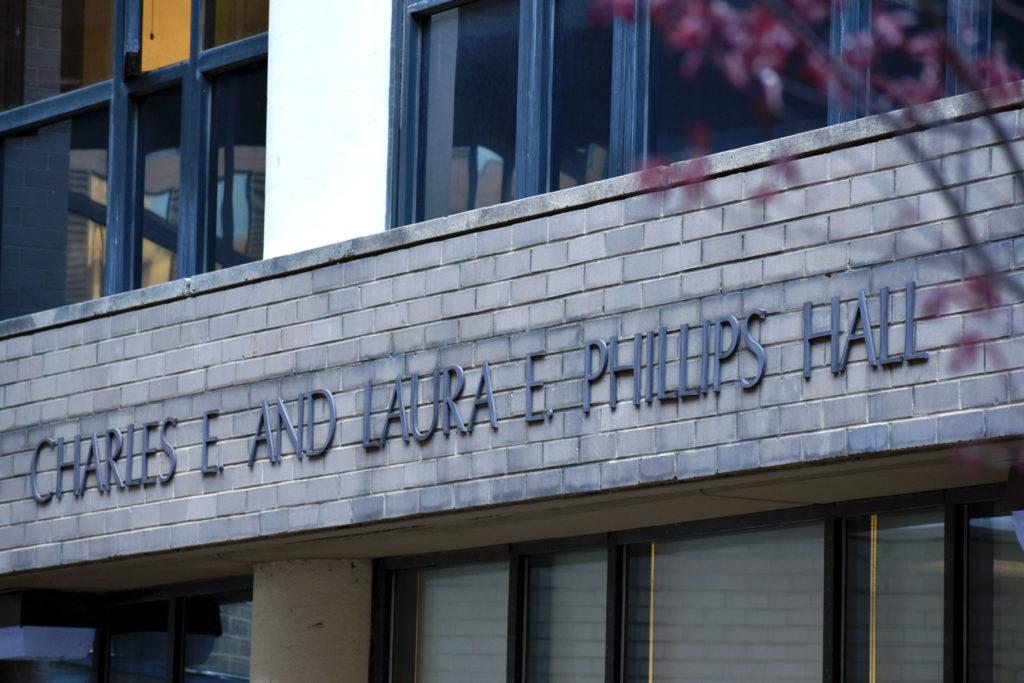One by one, a dozen doctoral students stood in front of a panel of three judges in the Marvin Center Friday waiting for a go signal.
They only had 180 seconds to explain months of research, endless long nights and rewrites upon rewrites. If they could best explain their dissertation to the judges – with the aid of a single PowerPoint slide – those three minutes would make them $1,000 richer.
The Columbian College of Arts and Sciences hosted its first-ever three-minute thesis competition last week, and officials said they now intend to hold the event annually. Judges and participants said the contest challenged doctoral students to describe their findings quickly and colloquially to a crowd of individuals who may not be familiar with the ins and outs of their field or specialty.
Melissa Busskohl, the director of graduate studies and students services in CCAS and one of the event’s organizers, said that after the contest’s rules were explained to the audience, students gave their brief presentations, followed by deliberation between the judges. She said judges awarded first-, second- and third-place prizes of $1,000, $750 and $500, respectively.
“We just wanted something like a fun competition for our Ph.D. students to celebrate their research,” Busskohl said.
She said three faculty members from the political science, art therapy and physics departments were chosen to judge the competition. Graduate studies staffers asked the judges to participate and intentionally selected judges from diverse fields to account for the wide range of dissertation topics, she said.
Busskohl said she hopes other schools at the University will start their own competitions to offer all of GW’s doctoral students a chance to participate. She added that officials from the School of Engineering and Applied Science and the Graduate School of Education and Human Development have reached out to the CCAS organizers about holding their own contests.
“We definitely want to continue it,” Busskohl said. “Our students enjoyed it. They had fun. I look forward to doing it next year.”
Jeffrey Brand, the associate dean for graduate studies in CCAS, said the event was a “perfect change of pace” for doctoral students from working in their labs or in a library each day. He said learning how to speak concisely about their work is a valuable skill for students to obtain before graduating.
“This is a unique opportunity for them to present their work in a succinct, accessible way,” he said in an email.
Brand declined to say if the event was open to all current doctoral students in CCAS.
Eric Grynaviski, one of the contest’s judges and an associate professor of political science, said he and the other judges – Harald Griesshammer, an associate professor of physics, and Heidi Bardot, an associate professor of art therapy – scored competitors on their audience engagement and the comprehensiveness of the presentation.
He said presenters needed to ensure that they effectively explained the technology they used in their thesis research, the findings of their research and the significance of their findings to someone with a background in a different area.
“The benefit of the competition is it encourages students to think about how they’re going to present their work to future funders, to future employers, to their friends and family,” Grynaviski said.
Jiaqi O’Reilly, a doctoral student who received $500 for winning the people’s choice award at the competition, said her dissertation focused on a hormone’s effects on brain development. She said she joined the competition after receiving an email asking for doctoral students to sign up.
O’Reilly said participants were only allowed to use one PowerPoint slide to assist them during the presentations. She said the challenge allowed her to “step back” and examine her thesis from the point of view of a non-expert, which she does not often consider because she is in the weeds of her research.
“When you’re doing a Ph.D. and you’re very into your research, it’s very difficult to remember you’re becoming an expert in this field, and terms that are used regularly in your research are not terms that are used in the general audience,” O’Reilly said.





